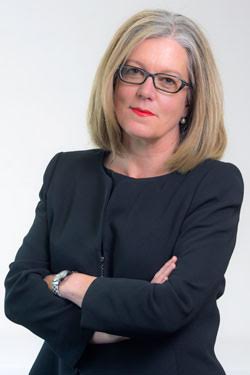
Productivity Commission Deputy Chair Karen Chester.
At the Australian Digital Alliance Forum, the first keynote from the Productivity Commission’s Deputy Chair Karen Chester busted myths about fair use. “Fair use has become not a nice-to-have, or even a good-to-have, but a policy must-have,” she said. She also charged in Q&A that those myths are being fecklessly promoted by industry actors.
Australian policymakers have grappled for 20 years with the question of how to loosen up copyright enough to make it work for creative producers, technology innovators and public interest organizations such as museums and libraries. Australian copyright law currently is one of the most conservative and unbalanced in the world; the only exceptions that could override a copyright holder’s monopoly are highly specific and don’t take consideration of a digital environment. Recently, the Productivity Commission strongly recommended (as six other inquiries have before it) that Australia adopt fair use.
As Peter Martin documented in a Sydney Morning Herald article, Chester noted that the Commission conducted a deep inquiry throughout the society’s interests, in order to figure out “what is fair.”
 Myth: Fair use is uncertain. Chester asked, “Could fair use be worse than what we have?” She said that the Commission heard from librarians, documentary filmmakers, and curriculum designers who found their work hampered by fair dealing’s restrictions and uncertainties.
Myth: Fair use is uncertain. Chester asked, “Could fair use be worse than what we have?” She said that the Commission heard from librarians, documentary filmmakers, and curriculum designers who found their work hampered by fair dealing’s restrictions and uncertainties.
Schools found themselves paying millions for freely available web content. She noted that courts in other countries have set precedents useful to Australia in establishing certainty, and guidance documents like the Codes of Best Practices in Fair Use further help communities make sense of fair use.

Myth: Fair use is free use. Chester debunked this quickly, showing that Australian law, Canadian fair dealing and US-style fair use all require that new fair uses not intrude on the original market. She noted that Google Books is vastly misunderstood in Australia as a ripoff of authors’ work, when it is actually the 21st equivalent of “browsing in a bookstore.”

Myth: Fair use destroys publishing industries. The Productivity Commission studied one dire report (from PriceWaterhouseCooper, prepared for collecting societies) and revealed, to PwC’s embarrassment, the weaknesses of its assertions.When the PC asked publishers for more accurate evidence of harm, they heard only crickets, “the sound of silence.”
Chester argued that the future of Australian culture and economy depends in part on improving copyright law, because today’s environment is not fair. “The inequities and costs the present system are growing and will continue to do so with technological and digital advances.” Worker retraining, efficient workplace practices, and education are all at stake.
Chester crisply addressed what she described as a disinformation campaign conducted by “wolves in sheep’s clothing,” presumably the publishers, large media companies and collecting societies she referenced elsewhere in her speech. “It does beggar belief that some folk have suggested our report ignores the evidence. For those folk, it is the very breadth of our evidence that helps us to assess what some claim to be evidence but what on closer examination proved to be groundless and (at times) self-serving assertion.”
Chester called on creators to challenge the organizations that claim to represent them to provide solid evidence for their alarmist assertions. “It’s hard to do good public policy in a post-truth world,” she said. “The Productivity Commission has to play fair, even when others do not. I admire authors, and am a great bibliophile. It is hard to see them used in the media for disinformation.”
